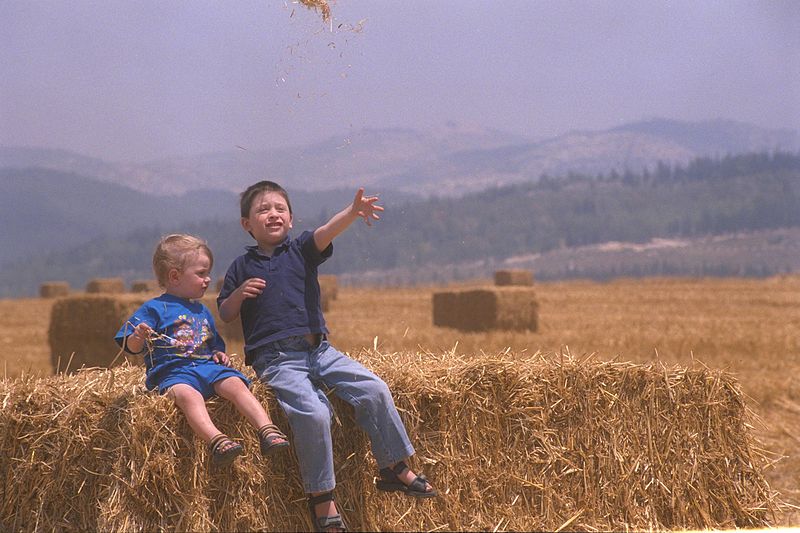
Chag HaShavuot is the second of the three annual chagim (Pilgrimage Festivals) in the Hebrew Calendar. In English Shavuot is known as the Feast of Weeks or Pentecost.
The chag is known by various names. It is known as Chag HaShavuot (Feast of Weeks) in Shemot 34:22:
The Pilgrimage-Festival of Weeks (וְחַג שָׁבֻעֹת) you are to make for yourselves, of the first-fruits of the wheat cutting, as well as the Pilgrimage-Festival of Ingathering at the turning of the year.1
This same term for the chag is also used in Devarim 16:10:
You are to observe a pilgrimage-festival of Weeks (חַג שָׁבֻעוֹת) to the Eternal One your God according to the sufficiency of the freewill-offering of your hand that you give, as the Eternal One your God blesses you.1
Shavuot is also known as Chag HaKatsir (Festival of Cutting/Reaping) as seen in Shemot 23:16:
…and the Pilgrimage-Festival of the Cutting (וְחַג הַקָּצִיר), of the firstlings of your labor, of what you sow in the field; and the Pilgrimage-Festival of Ingathering, at the going-out of the year, when you gather in your labor’s (harvest) from the field.1
Shavuot is also called Yom HaBikkurim (Day of the First Fruits) as we seen in Bamidbar 28:26:
And on the Day of the Firstfruits (וּבְיוֹם הַבִּכּוּרִים), at your bringing-near a new grain for the Eternal one on your Feast-of-Weeks, a proclamation of holiness there is to be for you, any kind of servile work you are not to do!1
Unlike Rabbinical Judaism, Karaite Judaism does not follow the tradition that Shavuot is the anniversary of the Revelation at Har Sinai since there is no basis for this tradition in the Tanakh.2
Shavuot is the only one of the chagim in the Tanakh not given a fixed calendar date. Instead, we are commanded to celebrate this chag at the end of a 50-day period known as the Counting of the Omer. Shavuot falls on the 50th day of the Omer.
And you are to number for yourselves, from the morrow of the Sabbath, from the day that you bring the elevated sheaf, seven Sabbaths-of-days, whole (weeks) are they to be; until the morrow of the seventh Sabbath you are to number – fifty days, then you are to bring-near a grain-gift of new-crops to the Eternal One. … And you are to make proclamation on that same day, a proclamation of holiness shall there be for you, any kind of servile work you are not to do – a law for the ages, throughout your settlements, into your generations. (Vayikra 22:15-16, 21)1
In the late Second Beit HaMikdash times there arose a debate between the Boethusians and the Pharisees about whether the “morrow of the Sabbath” refers to the Sunday during Chag HaMatzot or the second day of Chag HaMatzot (16th of Nisan). Like the Boethusians and the ancient Yisraelites, Karaites count the 50 days of the Omer from the Sunday during Chag HaMatzot. This means that unlike the Rabbinates, Karaites always celebrate Shavuot on Sunday.2
Since we no longer have a Beit HaMikdash, we offer prayers in place of offerings and sacrifices as we see in Hoshea.
Take words with you and return to the Eternal One. Say to Him: “Forgive all sin and accept what is good. We will offer confession in place of bullocks.” (Hoshea 14:3)3
Shavuot commemorates two events: the conquest of Eretz Yisrael and the sowing of Eretz Yisrael with seeds. Eretz Yisrael must receive the Eternal One’s blessings which depends upon the Yisraelites keeping the Eternal One’s mitzvot.4
Some Karaites – like the Rabbinates – eat dairy products and honey on Shavuot as a symbol of our hopes for the New Year. Food from the new crops and dried fruits left over from Chag HaMatzot are also eaten.4 In addition, extra prayers are offered on this chag in place of the offerings brought to the Beit HaMikdash.
=================
1Everett Fox. The Five Books of Moses. New York: Schocken Books, 1997.
2Nehemia Gordon. “Shavuot.” karaite-korner.org. Karaite Korner, 2008. [http://karaite-korner.org/shavuot.shtml]
3Aryeh Kaplan. The Living Nach: Later Prophets. Brooklyn: Moznaim Publishing Corporation, 1995.
4al-Qirqisani Center. An Introduction to Karaite Judaism: History, Theology, Practice, and Custom. Troy, NY: al-Qirqisani Center for the Promotion of Karaite Studies, 2003.
